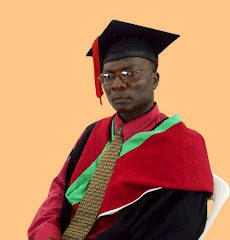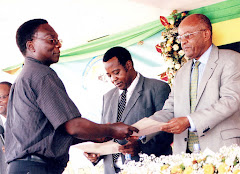Monday, March 23, 2015
Please pay your attention to this message
Dear readers,
I dearly welcoming you to this blog to continue enjoying the most current news that makes you become aware of what is happening around you and within the Tanzanian society. My name is Emmanuel Onyango, I am currently based in Dar es Salaam. As concerns with my profession, I am a practicing journalist and I am currently working with the Guardian Newspaper in Dar es Salaam.
I dearly welcoming you to this blog to continue enjoying the most current news that makes you become aware of what is happening around you and within the Tanzanian society. My name is Emmanuel Onyango, I am currently based in Dar es Salaam. As concerns with my profession, I am a practicing journalist and I am currently working with the Guardian Newspaper in Dar es Salaam.
How poor sanitation denounces Dar city mega status
Imagine that it’s your first time to have visited Dar es Salaam city and might become so impressed by its fine looking scenery that is enshrined with high skyscrapers which are being constructed within the city centre and its environs in a modern magnificent scale. Such a scientific development currently being undertaken is an indication that real estate investment is picking up and growing at a much rapid pace in the country. On looking at tall buildings, one might get an impression that it is the most and well developed city among others in the world that is well planned with the modern scientific style that could give a mega status of a modern city one could think about. Despite of all these developments taking place alongside the government’s efforts towards making Dar es Salaam city to achieve its mega status dream for the state, poor sanitation continues to blight the city’s drive towards this achievement. If you tend to walk in some areas within the city centre especially round Kariakoo market complex, the environmental situation around reveals a shocking, yet almost amusing fact about the continued bad state which is littered with uncollected heap of garbage filth in almost every street. A recent survey in the area has discovered that, apart from uncollected stinking filth, in some areas sewer water could be seen flowing along the street giving out horrible smell to passersby, and this is due to the dilapidated underground sewer pipes whose infrastructure are worn out and needs replacements. As you walk along in some streets within the city, one could feel bad smell of human excreta coming out of leaking sewer pipes. You might ask yourself why the situation is like this and probably you could throw a severe blame to the city fathers for their failure to supervise leakages on sewer pipes. Most streets in the area poses health hazards to the people around as their situation is more appalling. Among the most notorious ones includes the Livingstone and Aggrey streets, the latter street has underground sewer water pipes which is drifting causing inconveniences to passersby. Next to it is the famous Mchikichini street which is notorious with littered scraps of papers scattered along the street left uncollected for longer. The situation along Sikukuu and Pemba Streets are so pathetic as petty traders could be seen selling their food crops and other merchandise over open trenches which is full of stagnant water draining from a nearby residential areas which gives out bad smell with customers seem not to care about it. Other areas includes Msimbazi Street, Nango’mbe Street which also look so pathetic and have so far been left unattended. A spot check by the Guardian reporter in these areas has discovered that, ordinary people including petty traders who conduct their daily business activities are seriously inconvenienced with the regular obnoxious odour emitting from the dilapidated underground sewer water pipes. Interviewed residents around the area have been disappointed and became despaired with the situation which to some extent poses to their health hazards saying that during rainy seasons the situation becomes worse and more intolerable.
Children scavenging on a garbage heap near the town.
According to health experts, exposed open trenches pose a great threat to people’s health and might cause numerous diseases including diarrhea, or might be the source of some generic problems resulting as one of the most deprived condition for human health. Contacted for comments, the spokesperson of the Ilala Municipal Council Tabu Shaibu who admitted the prevailing situation put it clear that, repairs of underground water pipes is entirely the responsibility of the Dar es Salaam Water Supply Authority (DAWASCO). She claimed that, the water authority seem to ignore their responsibility thus prompting many city residents think that the replacement of such worn out infrastructure is executed by Ilala Municipal council whereas is not the case. Clarifying over the matter she said that, ‘there is a long standing controversy between her municipal council and the city water authority over their failure to replace the worn out underground water pipes an aspect that renders their efforts to make the city clean. On her side, speaking over the matter, the DAWASCO’s Public Relations Officer Evalasting Lyaro said that, his company is trying all it can in order to remedy the situation which she admitted to be causing inconveniences to the people around. She noted that, despite efforts shown by DAWASCO, but the increasing population density is another exacerbating factor that causes the underground sewer water pipes to fail work properly causing a leakage to some of them. She also noted of the continued habit by some unfaithful citizens who are fond of vandalizing some infrastructures and that the situation keeps untidy for the development of the drainage systems for the underground sewer water in the city. She also cited the continued influx of people from rural to the city is another serious factor that, the three Dar es Salaam Municipal Councils are struggling to control the bulging population density in search of jobs for livelihoods but in vain. Statistics made available by Ilala Municipal Council shows that, it is estimated that an average of 9 people have been entering in Dar ers Salaam city on daily basis since 2000 in search of livelihood an aspect that is a cause of high congestion causing use of water infrastructure to become congested. But few people may appreciate the extent of this problem which is fast becoming an epidemic in the state. Most tourist serving companies restricts visiting tourists not go to Kariakoo citing the fact that, the area is dirty littered with stinking filth around and more worse is full of thieves and there is absolutely nothing there to buy other than cheap Chinese knock offs. Dar es Salaam is a coastal city on the Indian Ocean. The city is undergoing noticeable changes in its urbanization trends and the flow of inland migration. All experts interviewed coincide that the rate of population growth exceeds the rate of provision of basic services.
A heap of uncollected filth along the main road.
Three weeks ago, members of Parliament strongly blamed the government for failure to maintain cleanliness in Dar es Salaam city. They made their concern in the wake of failure by the government to take drastic measures that would ensure the city looked clean. They argued that sheer laxity, corruption and poor performance within Dar es Salaam’s City Council authorities have brought about a total failure to make this commercial capital a clean and tourist friendly site. The Kinondoni Member of Parliament, Iddi Azzan said the three municipalities within the city lack capacity to collect garbage in their respective areas. He said: “It is wrong for the central government to leave the task to the municipalities, which do not have the capacity”. This poses an enormous challenge for city authorities, who have to deal simultaneously with making the city livable and hazard-free. Responding to other queries as related with the Dar es Salaam city situation in Parliament recently, the deputy minister in the Prime Minister's Office (Regional Administration and Local Government), Aggrey Mwanri, said the government has plans to ensure that all urban centres in the country, including Dar es Salaam, are clean. He was responding to a question from Mwanamrisho Taratibu Abama (Special Seats-CUF) who had wanted to know what strategies the government had to ensure that the city is clean. According to Mwanri, one of the strategies is the planned launch of a ‘Dar es Salaam metropolitan project’ that will cost over 500bn/- in the coming financial year of 2015/16. The deputy minister said cleanliness of towns and cities are stipulated in the various Environmental Acts of 2004 and Social Health Act of 2009 along with various municipal by-laws. He said the government abides by these laws in ensuring that all towns and cities keep the environment clean and avoid diseases caused by dirt. He blamed the terrible state of sanitation in the country’s cities on lack of modern equipment but nonetheless confessed that ‘oversight of laws by different stakeholders, including local government authorities, has rendered many urban centres filthy.’ According to Dar es Salaam city Mayor Dr. Didas Masaburi, Dar city is estimated to be producing 4,252 tons of filthy per day, which among this 70 percent are dumped in dumping sites as the city is curbed with the scarcity of modern facilities of garbage collection. According to him, the underground city infrastructures are worn out and some maps of the former infrastructures are not in place. Ranked among the top dirtiest cities in Africa, Tanzania’s commercial capital, Dar es Salaam, was established in 1857 by the Sultan of Zanzibar, Seyyid Al-Majjd, as the designated new capital. He moved to this new city in 1862, but died before accomplishing his development plans for the new capital. He named this city Dar es Salaam or “Haven of Peace” for its good weather, a good port position in the Indian Ocean, and a good direction of trade winds. Today, Dar es Salaam is growing to be known as one of the dirtiest cities in the world, holding the 12th position as a dirtiest. Only weeks since a report named Dar es Salaam the dirtiest city in the country, waste management companies operating in the country’s commercial capital allege what they describe as an ‘absolute lack of cooperation by municipal authorities.’
Tuesday, March 17, 2015
Central corridor zone welcomes international investors
TRANSPORT ministers from five countries in East and
Central Africa who formed the Central Corridor Transit Transportation
Facilitation Agency (CCTTFA), have launched the first ever acceleration process
of the high level investors’ forum to
speed up the transitional infrastructure development for the great Lakes
region. CCTTFA countries which include Tanzania, DCR, Burundi, Rwanda and
Uganda ratified an agreement of facilitating infrastructural development along
the central corridor zone since its establishment in 2006 . The agency was
formed with a view to ensure that cargo clearances are efficient and transport
costs are minimized to ensure logistics efficiency and competitiveness. The
Minister for Transport Samwel Sitta said in Dar es Salaam last Friday that, the
process will open up an avenue for international investors who are willing to
come and invest in infrastructure for which the agency was formed that includes
port, railways and road infrastructure within the Central Corridor zone. He
told a press conference after a two hour closed door meeting of CCTTFA country
transport ministers and their representatives that the aim is to ease
transportation infrastructure within the central corridor zone which starts
from Dar es Salaam port and moves along the central railway line up to Kigoma
and across Lake Tanganyika to the neighboring DRC country.
Another area of
investment within the corridor he noted would include road infrastructure and
ports including the dry port of Isaka in Shinyanga region currently under
construction to receive transit cargo to
be destined for Rwanda and Burundi countries respectively. Minister Sitta
further noted that, transport facilitation programme is also in line with the
agreement earlier ratified by five East African countries under Single Customs
Territory (SCT) with a view to facilitate the accessibility of their exports
and imports through Dar es Salaam port. According to minister Sitta, the
yesterday meeting was convened also in preparation for the investors’ forum
which will be held back to back with the central corridor Presidential Round
Table (PRT) on March 25th later this month in Dar es Salaam, and the
event will be attended by Heads of States of CCTTFA member states. He further
elaborated that, the five Presidents of member countries will engage themselves
to discuss matters concerning with the transportation within the corridor and
among other activities, they will also inaugurate a block train that will carry
cargo to their respective countries. “Presidents of Rwanda, DRC and Burundi
will flag off a block train one after the other that will transport cargo to be
destined to their respective countries”, he said adding that the event will
take place at Dar es Salaam main Railways Station. It can be recalled that, the Central Corridor
Acceleration Process was launched in Davos in January 2014 during World
Economic Forum (WEF) meeting. The programme seeks to accelerate infrastructure
investments through Private Sector Participation. The central corridor was
selected as the pilot project out of 51 projects under programme for
Infrastructure Development in Africa-Priority Action Plan (PIDA-PAP)
Energy expert advises Tanzania to create conducive environment for local investors
The senior energy advisor with the United
States Agency for International Development (USAID) has said that, “Tanzania
need to create a conducive environment that focuses on enhancing Private sector
participation in the implementation of Private Public Partnerships (PPP) in the
country”. Dr. Michael Boyd who is a USAID representative in Tanzania made the
observation on Friday night this week in Dar es Salaam at a gala dinner
ceremonial event organized on monthly basis by members of the CEO Round Table. He
said the private sector participation is very crucial for the country’s economic
development especially at this time when gas and oil exploration is taking
place in southern part of the country. He said Tanzania need to create a
conducive environment for the local investors as a viable way of unlocking
private sector investments so as to meet specific requirements in key sectors
that includes energy, agriculture, infrastructure and tourism in ensuring
inclusive socio-economic development. He gave as an advice to the government
that it needs to build a close relationship with the private sector as one way
to empower them by providing training to its local entrepreneurs on gas so as
to make them become knowledgeable with enough skills which will make them
benefit with gas production in future. He said although it might take time for
the government to undergo in this transformation process, it has to get
prepared to spend time and money for future development instead of depending
much on foreign investors who look after money. He further noted that, experience
all over the world shows that, every country where there is gas production,
governments maintained a good and closer relationships with the private sector
in order to strengthen their internal market economy. However, he gave an
example of one country Brazil which spent many years in training their local
experts on gas energy and now is self sustaining with the gas production in
their country in an open and transparent manner. On his part, the Assistant
Director in charge of Private Sector Development in Prime Minister’s Office,
Azamo Maponde said that, the government is planning to establish PPP
Facilitation Fund which would help enhance private sector development schemes. The
aim is to effectively enable the private sector companies to facilitate their
economic activities in a b id to dominate the local market for the country’s
growth. He said the idea has come at this opportune time after the passing of a
2014 PPP Amendment Act which sought to address challenges highlighted as
significant milestone for the private sector in the country. He said the PPP
facilitation fund is endorsed in the new amended Act and that, the Prime
Minister’s office would undergo a process to ensure that it gets a reputable
bank in the country which would be in a position to maintain all the
transactions required according to the law. He further noted that, the PM’s
office would select the Bank by following the right procedures of tendering processes.
Founded in 2000, the CEOst is a policy dialogue forum
with the main objective of creation a platform through which captains of
industry can constructively engage the government with the vision of creating a
more conducive environment for businesses to prosper and contribute to Tanzania’s
economic growth.
Monday, March 9, 2015
An envoy warns Tanzania over albino killings, saying the trend will tarnish the nation
THE Swedish Ambassador accredited in the country has expressed his grave concern over the continued killings of people with albinism saying that the continued trend would tarnish a good image Tanzania has on the reputation of peace and harmony at the international level. Ambassador Lennarth Hjelmaker said yesterday in Dar es Salaam that, the government needs to take serious actions over the matter which has surprised the international community and finds ways on how to stop the escalating phenomenon. He said in an exclusive interview at a climax of a forum for youths and children with disabilities which his country had organized for three countries including Sweden, Tanzania and Rwanda. The Friday’s forum was attended by the Minister of State in Prime Minister’s Office Christopher Chiza as a Chief guest for the occasion which started on Tuesday this week in Dar es Salaam under the theme, “Come together to fight cruelty on children with disability” . He said the issue of the bad fame of albino killings in Tanzania has widely spread at a global community since such incidences broke out in the year 2000, an aspect which has brought chock to peace keepers as the action is so terrible and that cannot be tolerated at all. However, Ambassador Hjelmaker has also thanked the government for the steps it has taken so far over the matter which has ensured the apprehension of the suspects and their trial before the High Court on murder charges.
Swedish Ambassador Lennarth Hjelmaker in Tanzania
Stakeholders at a forum discussed about the basic rights such as education for children with disabilities and called for urgent attention from governments to defend their rights wherever possible. This is the first ever congregation to be held in the country and was organized by the Swedish government through its international organization which is concerned with the welfare of the people with disabilities in the world popularly known by its acronym FUB. Earlier in his opening remarks, Minister Chiza assured people with albinism in the country of the safety measures which the government has intensified for their safety, and has called on the general public to join hands in the exposing people who are directly involved.“A joint cooperation among good citizens is one way to win the war which to a greater extent has caused fear of living for the affected people with albinism”, he said. On his part, a consultancy and a defendant officer for people with albinism with Free Pentecostal Church of Tanzania, Josephat Torner expressed his disappointment over how the government is looking at the matter and how it responds to the regular demands of the affected groups in the demand. He said in an exclusive interview that, no any efforts is seen to be seriously by the government to fight the trend, he queried as to why such killings are going on year after year and more worse when the elections are approaching. “Suppose a soldier could have been killed in such a manner, you could see how the armed forces undertake their cover in the search for the culprits”, he remarked and noted that it becomes less serious for albinos which the government takes their fate for granted.
Subscribe to:
Posts (Atom)














